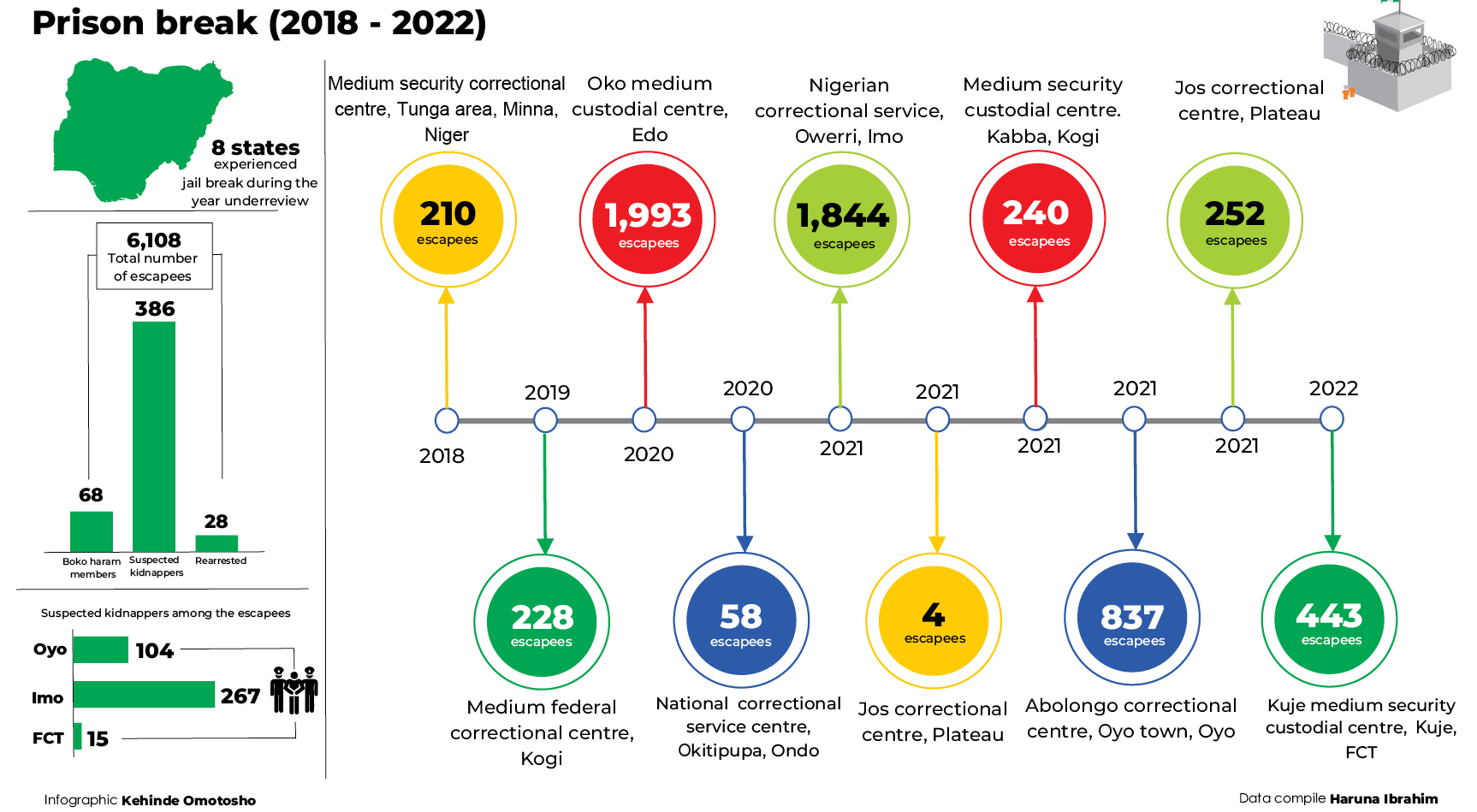In recent years, Nigerian custodial centres have witnessed a series of jailbreaks that continue to pose serious threats to the myriad of security challenges facing the country.
In these violent attacks, thousands of criminals, including terrorists, kidnappers, bandits and other high-profile criminals, were freed and returned illegally to the society.
BREAKING: PDP’s Adeleke leading as INEC set to make pronouncement on Osun Election
Osun: Oyetola, Adeleke in tight race as vote-buying mar poll
Aside from the grave danger the illegal release of the criminals portends to the society, it is now becoming a source of worry and embarrassment to the Nigerian security architecture.
A data compiled by Daily Trust on Sunday reveals that Nigeria has witnessed 10 jailbreaks in five years, leading to the escape of 6,108 inmates from 9 correctional facilities in Ogun, Jos, Ondo, Minna, Kogi, Benin, Owerri and Kuje.
Based on the data obtained, the most significant incident in Nigeria, and perhaps, beyond Africa, was the attack on the Kuje Medium Custodial Centre, where a total of 442 inmates escaped, including 68 Boko Haram detainees.
A source from the prison revealed that the invaders operated for over two hours, going cell by cell to free their men who were held in the facility.
At the end of the attack, an officer of the Nigerian Security and Civil Defence Corps (NSCDC) and four inmates were discovered dead and the over 300 attackers had vanished into thin air.
Less than 24 hours later, the Islamic State in West Africa Province (ISWAP) claimed responsibility for the attack, a development many analysts described as a serious setback to the country’s fight against terrorism.

No much detailed is available on the identities of the remaining hundreds of suspects released from Kuje.
A list our reporter obtained from the Nigeria Correctional Service (NCS) indicated that in most attacks, out of the 6,108 escapees, 386 inmates were suspected kidnappers awaiting trial.
The list, which was compiled in March 18, 2021, revealed that 267 suspected kidnappers were languishing in Imo, 104 in Oyo and 15 in Kuje custodial centres when the three separate attacks took place.
Although the Service said it had recaptured many escapees, it is not clear whether any of the kidnappers had been recaptured.
Timeline of jailbreaks
From April 5 to October 28, 2021, there were five jailbreaks in four correctional facilities in Imo, Plateau, Kogi and Oyo states, where a total of 2,177 inmates escaped.
On April 5, 2021, a nocturnal attack on the Imo correctional facility by a large number of hoodlums freed 1,844 inmates, out of which six returned voluntarily, while 35 refused to escape from custody.
The operation, which lasted from 1am to 3am, began after the assailants sang a solidarity song in front of the Imo State Government House in Owerri and told the inmates, “Go home, Jesus has risen. You have no reason to be here.”
Confirming the attack, the spokesperson of the Service, Francis Enobore, noted in a statement that the attackers took advantage of the #EndSARS protest to carry out the heinous act.
On September 12, 2021, the Medium Security Custodial Centre in Kabba, Kogi State, was also attacked by gunmen around 10.45pm, where 240 inmates out of 294 in custody were freed.
However, the Nigeria Correctional Service (NCS) claimed that it rearrested 114.
In a similar attack on July 8, 2021, gunmen attacked Jos correctional facility in Plateau State and freed 4 inmates.
In another worrisome trend, in September 2021, another jailbreak set free 240 inmates from Kabba custodial centre in Kogi State.
“The Medium Security Custodial Centre in Kabba has been attacked by yet-to-be-identified gunmen and 240 inmates forcefully released,” the NCS spokesman, Enobore, had noted in a statement.
On October 22, 2021, gunmen also set 837 inmates free at the Obolongo Custodial Centre in Oyo State but the Service said it had recaptured 262.
“A total of 262 escaped inmates had been recaptured, while 575 were still at large,” Olanrewaju Anjorin, the spokesperson of the NCS, Oyo State command said.
On October 28, 2021, another attack was launched at the Jos custodial centre in Plateau State, where at least 252 inmates escaped.
Also, on September 12, 2020, gunmen laid siege on the Medium Security Custodial Centre in Kabba, Kogi State, where they freed 240 inmates out of 294 in custody.
Days later, the Service claimed to have rearrested 114 escapees.
Also, on October 19, 2020, #EndSARS protesters broke into two correctional facilities in Benin City, Edo State and freed 1,993 inmates.
According to the correctional service, 82 inmates voluntarily returned while 35 refused to escape.
Prior to 2020 jailbreaks, on October 28, 2019, a heavy downpour at Katon Karfe led to the escape of 228 inmates from the Medium Security Custodial Centre in Kogi State.
The inmates managed to escape after some parts of the building collapsed.
Also, on June 3, 2018, some armed men attacked the Medium Security Custodial Centre in the Tunga area of Minna, Niger State, freeing over 200 inmates. Only 28 were rearrested.

Escapees return to terror
Following the unlawful release of the convicts, some of them have returned to their old ways of committing crimes, therefore, threatening the peace of the society.
In Imo State, one of the escapees from Oko Custodial Centre rushed back to his village and killed the prosecution witness who testified in the case that took him to the centre.
A former commissioner of police in the state, Babatunde Kokumo, said the escapee was among 10 fleeing convicts rearrested by the police.
“Another group of three escapees from the custodial centre in Benin also went ahead to snatch a Lexus Sport Utility Vehicle (SUV). Three of them met at the correctional centre and they were caught by the police.
“A set of two escapees equally stole a Toyota Camry car. They also met at the correctional centre. They were arrested by Okada Division of the Edo State police command.
“Guns were also recovered from the criminal elements.”
Also, a terror suspect that escaped from the Kuje custodial centre, Suleiman Sidi, was re-arrested by operatives of the National Drugs Law Enforcement Agency (NDLEA) at the Area 1 motor park in the Federal Capital Territory while he was attempting to board a commercial vehicle to Maiduguri, Borno State.
The director, Department of Media and Advocacy of the agency, Femi Babafemi, said the suspect was arrested with drugs, and that during preliminary interview he confirmed that he was remanded at the Kuje Custodial Centre for terrorism and robbery charges.
Poor facilities despite huge budgetary allocations
Despite the growing trend of jailbreaks across the country and the huge budgetary allocation to the agency, many custodial centres in Nigeria have remained dilapidated, with no facility upgrade to meet modern day technological standard.
Statistics showed that in the history of the correctional centre, the current administration has made the highest allocations to the sector, but the impact is yet to show as the facility has continued to grapple with infrastructural challenges and other basic facilities in various centres across the country.
Analysis by DATAPHYTE, a data journalism platform, revealed that the federal government has appropriated over N613.5bn to the Nigerian Correctional Service in the last 10 years.
It also pointed out that in the same period, not less than N88.4bn had been allocated for capital expenditure.
It’s on this note that both President Muhammadu Buhari and Senate President Ahmad Lawan expressed disappointment, having discovered that at the time of the attack, there were no Closed-Circuit Television (CCTV) cameras at the Kuje custodial centre to record the incident.
Nigerians at the mercy of criminals – Security expert
A security expert, Dr Ndubisi Ani of the Institute for Security Studies, said the incessant jailbreaks in the country had clearly shown that Nigeria has no proactive government.
“Nigeria is a country that is reactive; we respond to crises not proactively while trying to prevent it.
“From the crisis, you will know that information had already been given that there were people on the move who could likely attack the Kuje Custodial Centre, but there was no response in that regard.
“This is not the only the case; there were several reports. The National Intelligence Agency (NIA) gathered a lot of intelligence and passed to the respective persons who were supposed to act, but it seems there was lack of response to address the crisis before it got out of hand.
“So, at the end, people are left at the mercy of the bandits, terrorists and people who could increase crime in the country. For the country, it is not the jailbreak but the attack on the presidential convoy that made it clear that insecurity knows no boundary and it could affect anyone.
“As we are looking forward to how it will develop, it is a worrying trend for the country as we are also getting into an election period,” he said.
To address the issue head on, Ani said, “Security agencies have to be more proactive in their response and go after the people who have gone out of jail and re-arrest them. Also, there has to be an overhaul of the security system in the country. We have several security outfits, but then, we have to ensure that they are responsive to our needs rather than their pockets.
“And there should be better ammunitions, better welfare system for the security agents and their families for them to operate diligently. You can’t send a hungry person or someone who doesn’t have enough weapons or the backing of the government to go out fighting bandits who have a common course. It is very difficult to achieve in that regard.
“People should easily pick up their phones and call the government, the police or the military for intelligence report.
“Such confidence should be built in communities across board, such that they are able to rely on and trust the government.”
Data compiled by Haruna Ibrahim

 Join Daily Trust WhatsApp Community For Quick Access To News and Happenings Around You.
Join Daily Trust WhatsApp Community For Quick Access To News and Happenings Around You.


